I know where beauty lives
I've seen it once, I know the warmth she gives
The light that you could never see
It shines inside, you can't take that from me.
—Madonna, Live To Tell, 1986
The first concert I ever went to was the Virgin Tour at Madison Square Garden. My Cool Aunt took me. I was in the 8th grade. Everyone I knew was obsessed with Madonna and this event was anticipated with a level of excitement previously reserved for snow days and getting to the banana level in Ms. Pac-Man. To prove our devotion we wore black rubber bracelets up to our elbows. Giant silver hoops hung off our ears like Christmas ornaments. Enormous crucifix necklaces dropped from girls' necks, many of whom had just been bat-mitzvahed. Lace gloves wrapped around our hands, and cut-off fishnets half-hid underneath flared skirts. Kerchief-style bandanas made from ripped neon tights adorned our Sun-In-suffused heads. We pulled t-shirts down off our shoulders and a few of us may have even penciled in a mole above our lips.
Like pretty much everything else I loved in the 8th grade I loved Madonna mainly because all the girls I believed to be way cooler than I did. Whether they, the way cooler girls themselves, felt a soul-deep connection to the 26-year-old Catholic School educated ex-cheerleader from Michigan singing about having emerged from the wilderness, beat and incomplete, now made shiny and new by the mysterious attention of a presumably male you, I cannot say. But having received an offer for a discounted AARP membership on my last birthday (along with the promise of a free water bottle!) I can only look back into the recesses of early puberty and assume what we were most drawn to was Madonna’s freedom.
The freedom to turn boys into toys, by fiat of a belt buckle, yes. But more than that, the pure exhilaration she seemed to experience in the trying on of selves. She did it in between every song she sang at that concert. And she went on to do it for extended periods surrounding each album and film she would make over the next four decades. It’s also what you innately do when you’re a teenager before the world demands to know with any certainty who you actually are. But, while ours was an often tortured search, Madonna’s appeared ferociously joyful.
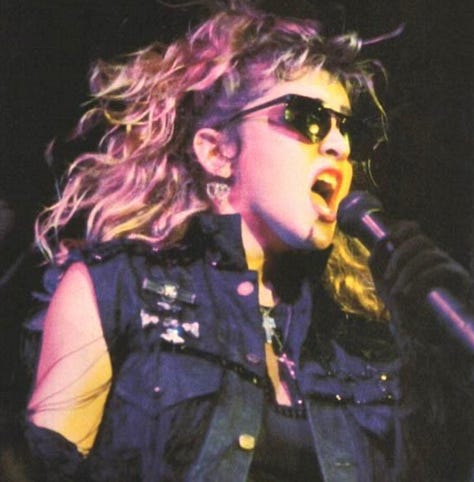
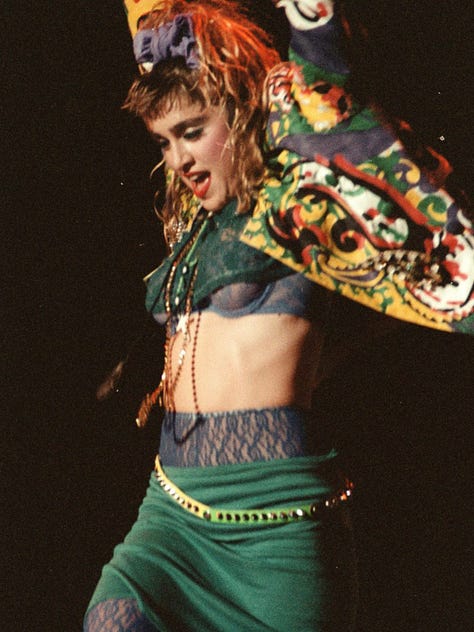

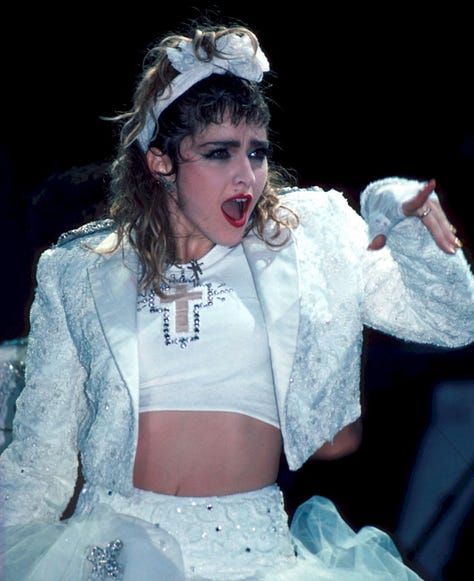
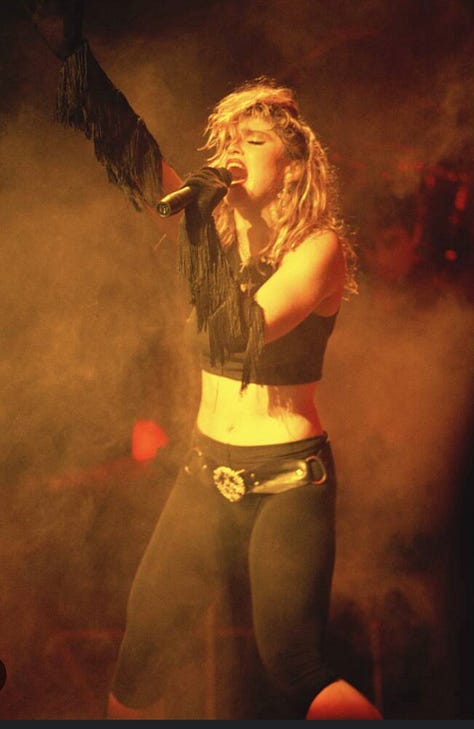

What I remember most about the concert is that when my aunt asked me if I wanted to get up and go to the railing of our section to dance, I said no, and instead sat there watching her from my seat. She is my mom’s much younger half-sister, only five years older than I am. But those five years, back then, were critical. She moved her body with ease in time to the music, seemingly lost in herself and in the sweaty electricity of the Garden. I looked at her with envy and with longing, swaying among twenty thousand strangers in a kind of human murmuration, some quiet recognition burning at a low flame in my consciousness that she possessed what I most wanted, a thing until recently I’d had: Fearlessness. Self-possession. A body that could take instructions directly from its heart with no mental or hormonal middleman growling that something’s missing or broken.
I was thirteen that night, just, and if I track it back this was precisely the age I started to lose my nerve. Don’t we all around then? When our bodies wake us up one day with concealed orders from on high to do things no one asked them to do? When boys and sometimes men feel suddenly entitled to comment on and even touch those bodies, too often without our consent? I’d worn her costume on that dusky hopeful late May night, but in the middle of a magic dome in the center of my City, I was light years from Madonna or any one of her many selves. I was Mary Pipher’s not-yet-written about Ophelia. Decades from revived.
“…It ends up going in front of your eyes, and then when it goes in front of your eyes, it’s inside your head….It comes up in your feed, and then you get pulled into it whether you like it or not. So it’s a challenge to rise above it, to not be affected by it, to not get frustrated, to not compare, to not feel judged, to not be hurt. You know, it’s a test…I preferred life before phone.”
—Madonna to Vanessa Grigoriadis in The New York Times, 2019
Hey, guess what? Despite all the truth-telling and trauma-excavating we did over the last five years, regardless of all the monsters we effectively exiled and occasionally even locked up in cages, teenage girls are still being told, maybe not as overtly, but always insidiously, that they need to be appealing. In general but also particularly. Mostly to boys and to men. Physically and emotionally. But let’s be honest about this, in their social-media-soaked lives, mostly physically. The good news is that along with the endless supply of filters promising to soften and enhance them into submission, there are lots of encouraging hashtags! Hashtag girlpower. Hashtag girlboss. Hashtag loveurself.
It is also true that different-sized bodies are being allowed to exist and to sell us things that fit real human beings living on the Planet Earth! This is an actual generational shift, and it’s more than good news, it’s great. But I’m personally aware of only one person who on a freezing cold February morning, a few short weeks after Donald Trump was inaugurated, wordlessly summoned six full city blocks of young people, most of them women and girls, all of them lined up to share the same small space and briefly breathe the same (pre-covid) air as the one launching a new lip kit at a pop-up shop in SoHo. Never mind that her own lips aren’t real or that the kit itself was borne from her mother’s cash-soaked vision of the self-hatred that invented it. The young woman’s name is Kylie Jenner and last time I checked she has 368 million more Instagram followers than Madonna.
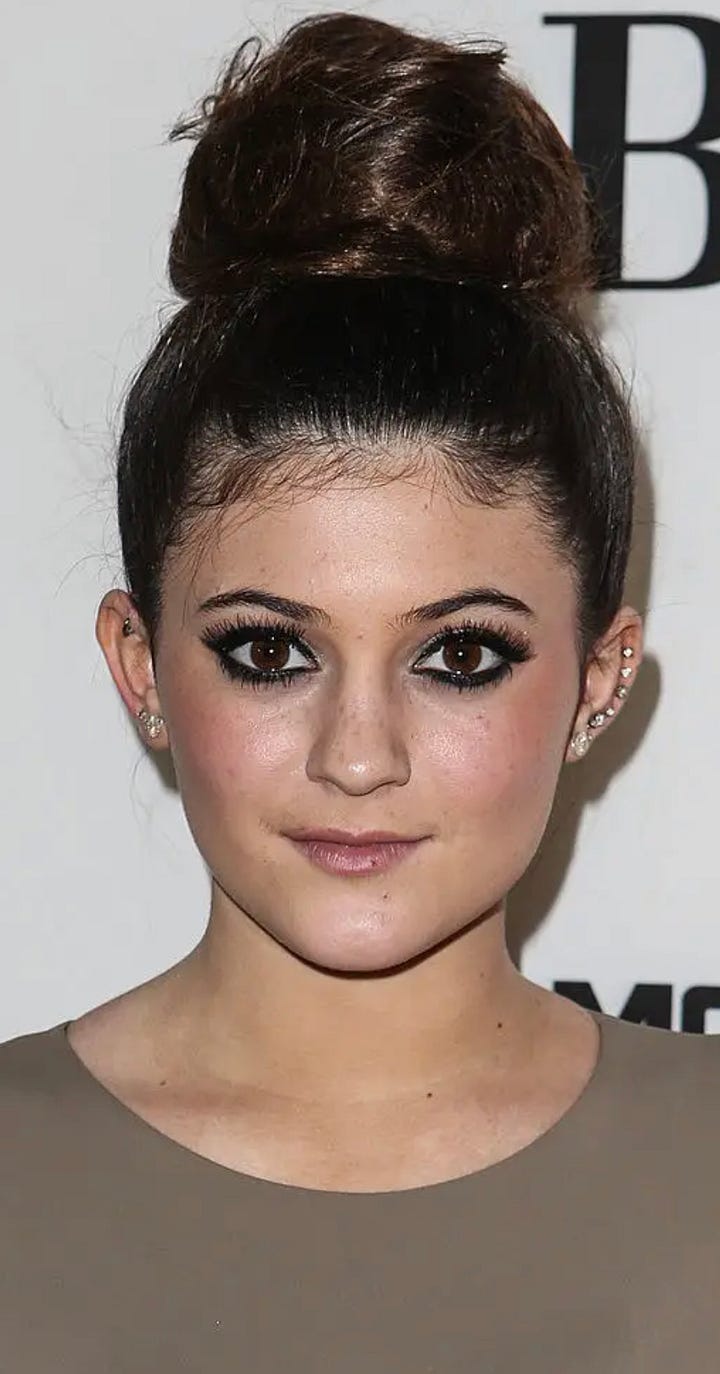
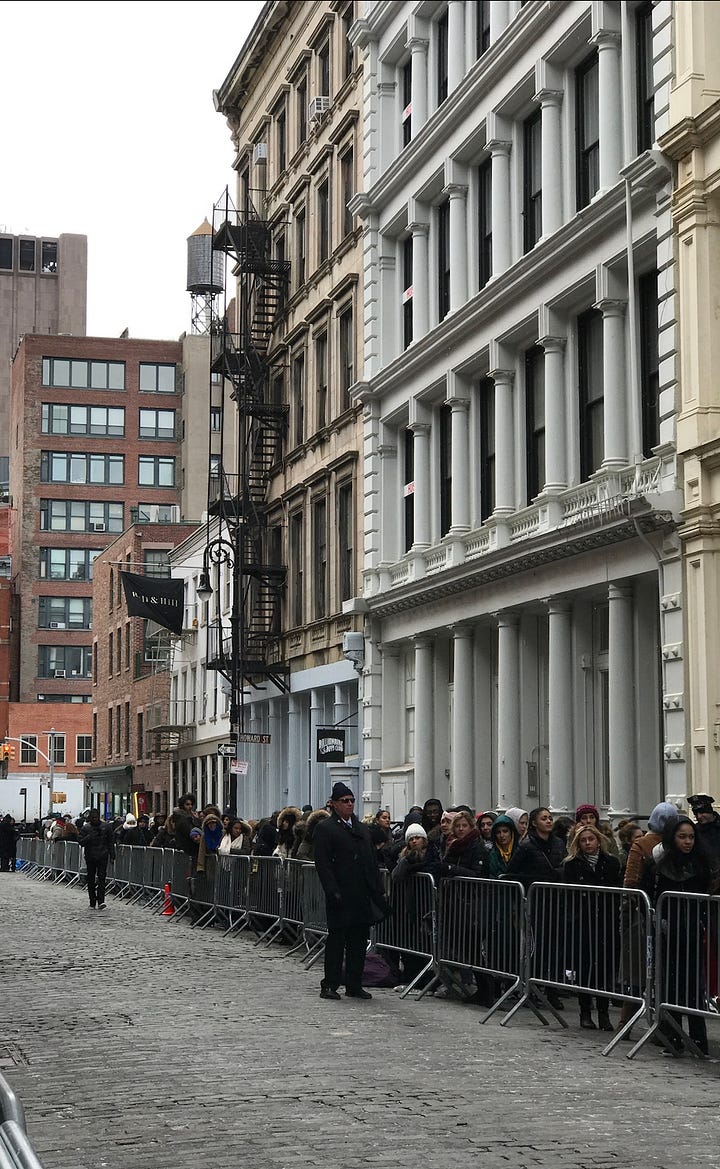
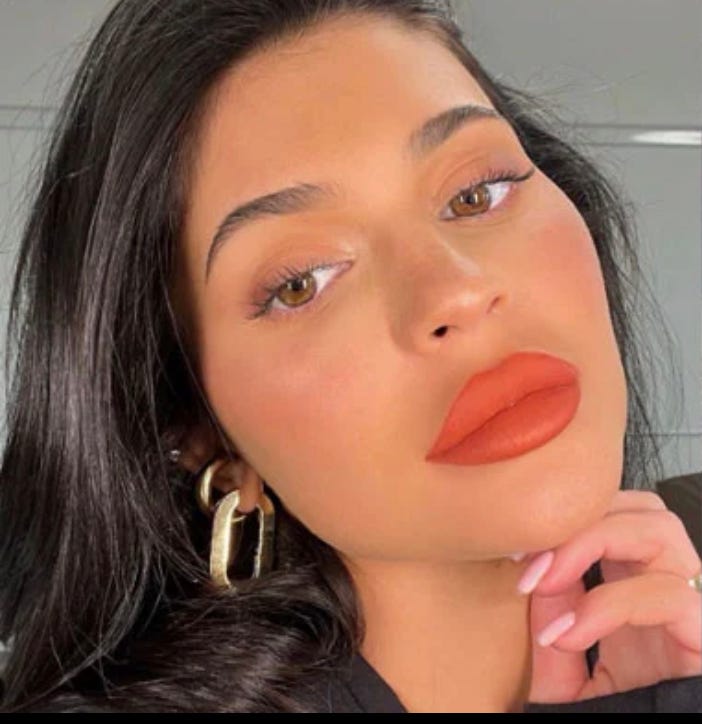
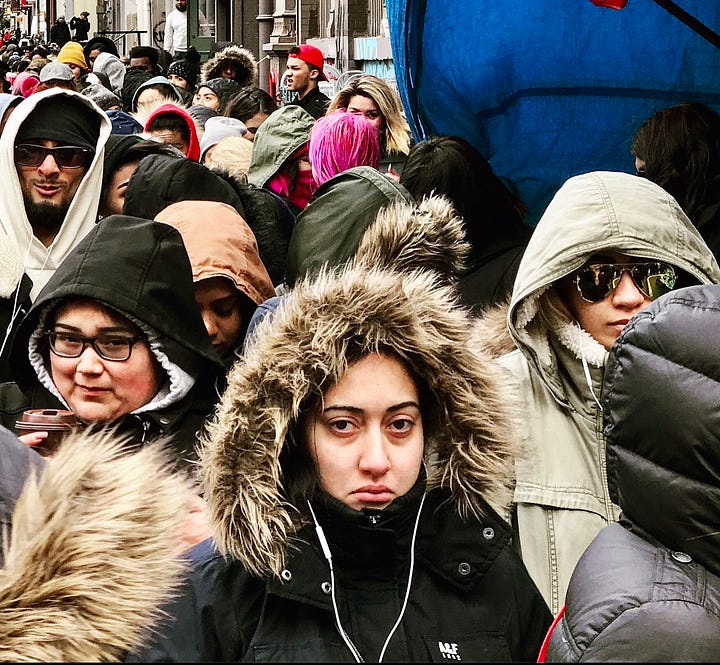
Another February in another city a few post-plague years later, Madonna took the Grammys stage to introduce Sam Smith and Kim Petras. If you were anywhere online that night then you were witness (and perhaps a party) to a feeding frenzy that would make the Romans blush. It was a murder in cold blood by Internet. WHAT HAPPENED TO MADONNA’S FACE screamed its denizens from every corner, in multiple variations on a singular theme. Google answered the question with these top image searches:
Plastic. Puffy. Bloated. Old. Pillow. Instagram. Swollen. Nightmare.
And listen, it is observably the case that Madonna’s face that night did not look like Madonna’s previous face. Exactly how that was accomplished none of us know. Not noticing or pretending not to notice obvious things in order to maintain our standing as quote-unquote good feminists haven’t generally served any of us well. But what the world meted out the night of the Grammys and in the discourse-y days that followed was by and large, cruel, unforgiving, and deeply misogynistic by any set of metrics.
Me? I said nothing, by which of course I mean I tweeted nothing and joined in on zero Facebook conversations, because who actually says things out loud to other people anymore? What I did was think to myself: women are forever fucked. But also I was waiting. I was waiting for the big reveal. The one where Madonna would tell us that what she was doing with her face is art. All the close-up gnarled gyrations and mock fellatio for the cameras of late? Another calculated performance. The notorious control freak was still in control, she had to be. Another middle finger in the face of society’s expectations, this time to the rigid age restrictions placed on female expressions of sexuality and desire. She was strutting across a carefully constructed stage of her own imagining, doing a choreographed examination of the contortions we put ourselves through to stop the ceaseless beat of time, an exegesis on the mania that arises when collagen has slowed down to a drip, a walking manifesto about the riptide of invisibility left in gravity’s unyielding wake. Look! Look how crazy it is what we do, have always done! I am Madonna and I have always been your mirror. I am only reflecting back your gaze. I am all of us. I am YOU.
My face is about trying to operate an entire human being atop 6 inch slivers of wood/My face is about actual starvation diets in order to look like Kate Moss and deadly fat-injecting surgeries in order to look like Kim/My face is about lying under the light of a dying star until the melanoma arrives at which point standing naked in front of a spray-can-wielding stranger all for our skin to stop looking like our skin/My face is about the needles and it’s about the knives/My face is about injecting a neurotoxin into our heads to make us appear unshockable and smooth/My face is about strings placed inside flesh to hoist up fallen cheeks/My face is about cutting all around our eyes/ My face is about the bags of jelly inside our chests/My face is about the lasers we emerge out from under with faces raw as tender meat/My face is about the blood pulled from veins, spun in circles by a machine, and then put back onto our skin/My face is about the required hairlessness in these locations and needing extra hair in these/My face is about the plucking and the shaving and the microscopic blading/My face is about baby fat you must get rid of for model-worthy cheeks/My face is about the cheeks you must add filling to so as not to look too old/My face is about the shadows and the highlighters and the concealers and the correctors and the YouTube videos you’ll stay up past 3am learning how to use instead of getting any sleep/My face is about she looks like a chipmunk she looks like a pillow she looks like a cat God she looks tired Jesus what is she wearing Wow she should really lose some weight Omg she looks too thin It’s really sad how she’s let herself go/My face is about too much too little too late too soon too loose too tight too dark too light/My face is about she’s desperate to look young why can’t she just age gracefully holy shit she looks so old.
I want her face to be a sacrifice so the rest of us will stop.
The last album Madonna released was a compilation of remixes she titled Finally Enough Love: 50 Number Ones. Not coincidentally the day it was issued she became the first act in history to have 50 number-one songs on a single Billboard chart. Another epic milestone for the woman who’s sold more than 300 million records worldwide, was already the best-selling female recording artist in history, as well as the highest-grossing solo touring artist of all time.
Finally Enough Love is taken from a line she repeats, in the most curious, almost mocking, tone at the end of that 50th number-one song called “I Don’t Search, I Find,” off of her fourteenth studio album, Madame X. Who is Madame X? A character Madonna created, taken from the nickname her dance teacher, Martha Graham, originally gave her when she was 19, apparently out of frustration that she could never "identify" who Madonna was. And here is how Madonna described the character she created forty years later from that name:
“She's a spy. She's a secret agent. She travels the world. She changes her identity. She sleeps with one eye open. And she travels through the day with one eye shut. She's actually been wounded. So she's covering up one of her eyes."
Now, stay with me here: Madonna has been an art collector all her adult life. She takes it very seriously. “I Don’t Search, I Find” from Madame X, with the chorus Finally Enough Love for which her most recent album is named, is itself a quote attributed to Picasso. So let’s just pause here for a brief moment to consider how that guy dealt with women, and how he tended to go about interpreting the female face.

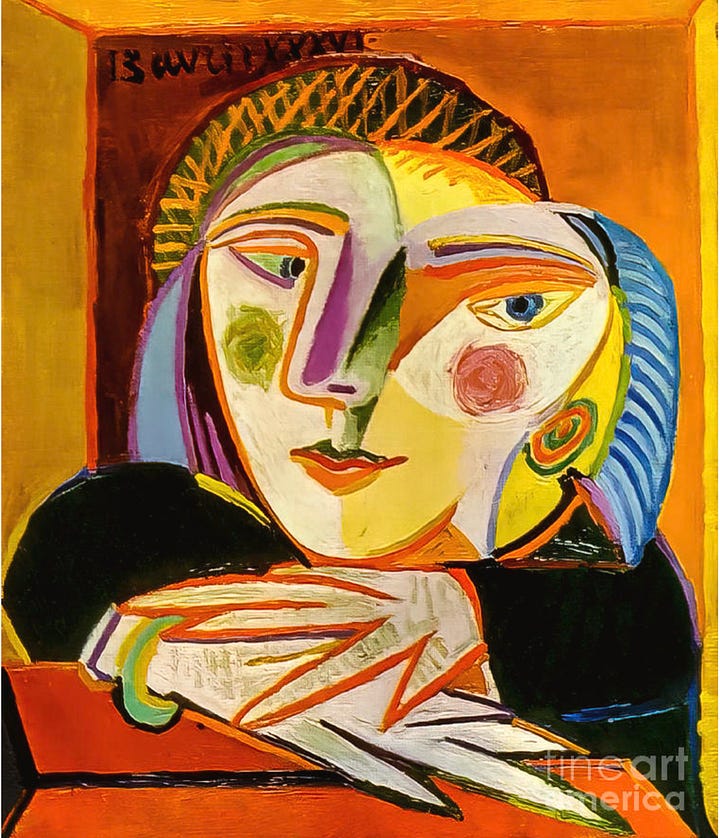
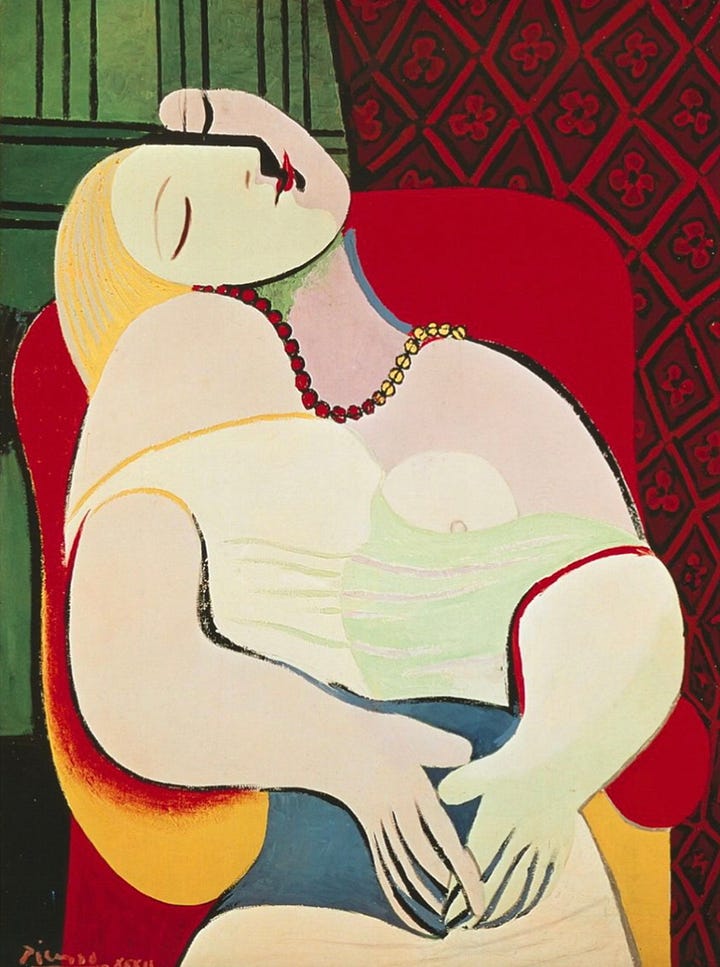

In Truth or Dare, the genre-bending precursor to much of our current reality show-soaked lives, Madonna visits the cemetery in Bay County, Michigan where her mother is buried. She brings white lilies and lies down in front of her grave. In a pensive voiceover, sounding soft and young, we hear her talk about what it was like to lose the angelic-seeming woman she was named for, at such a young age. And then we listen to her muse:
I wonder what she looks like now, just a bunch of dust.
The director of Truth or Dare has said he miked the cemetery without her knowledge and that the cameras there to capture her were “unobtrusive.” I mean, ok. But Madonna was the film’s executive producer and she put up the four million dollars it cost to make.
I want the ultimate control freak to still be in control of what we see, for our vision of her now to remain produced behind the scenes.
I just don’t think it is.
I think for the first five years of Madonna’s life, she had a mom who gazed at her with the unconditional look of love every child needs. I think one day, with no warning or explanation, the warm light of that deep devotion disappeared. I think all mothers are mirrors for their daughters, for better or for worse. I think the rupture a nervous system endures when its primary attachment figure gets torn away so young is seismic and brain-changing. I think that a child will do anything to survive. I think grief is a portal that can rearrange your cells and lead you to a kind of love that has no face because it is fleshless and eternal. But I think if you curate your grief for an audience, you may never experience what your body needs to feel safe. I think if an abandoned little girl only gets to hear from her grown-up self through a video on MTV, then the person she needs most is not actually listening.
I think seeking love from a source that isn’t yours is the original distortion. The image will be reversed and belong to the person looking. And if instead of forcing loose the Patriarchy’s grip on female freedom and expression, you find yourself—as Madonna described after the Grammys— “at the wrong end of a press photographer’s long lens” or seeking approval inside the number of likes Instagram will permit you to receive, then you’ve trapped your heart in a funhouse, and are a prisoner of its mirrored cage.

***
In the Spring of 1985, the threat of nuclear annihilation and death by sex rumbled at a not-great distance. One night though, after forty minutes of an unknown group of kids called the Beastie Boys jumping up and down across the Garden stage, after giant video stills of her were projected onto screens, but just before an already iconic silhouette would appear at the top of a set of stairs, a young woman’s voice could be heard, softly, over the speakers.
"Don't be afraid... it's gonna be alright," Madonna said.
Was she telling her dancers or her band or the audience? Was she making a promise to her future daughters, all four of them? None of us could ever know for sure. But, I imagine she was doing what she’s always done, whispering to herself while insisting we’re there to listen.
I want to whisper something back to Madonna now. Across 38 years and my own revival.
Behind the mirrors.
Beyond the phones.
Past the cameras veiled in cemetery trees.
There is enough love. There always was.
Close your eyes and let her find it.





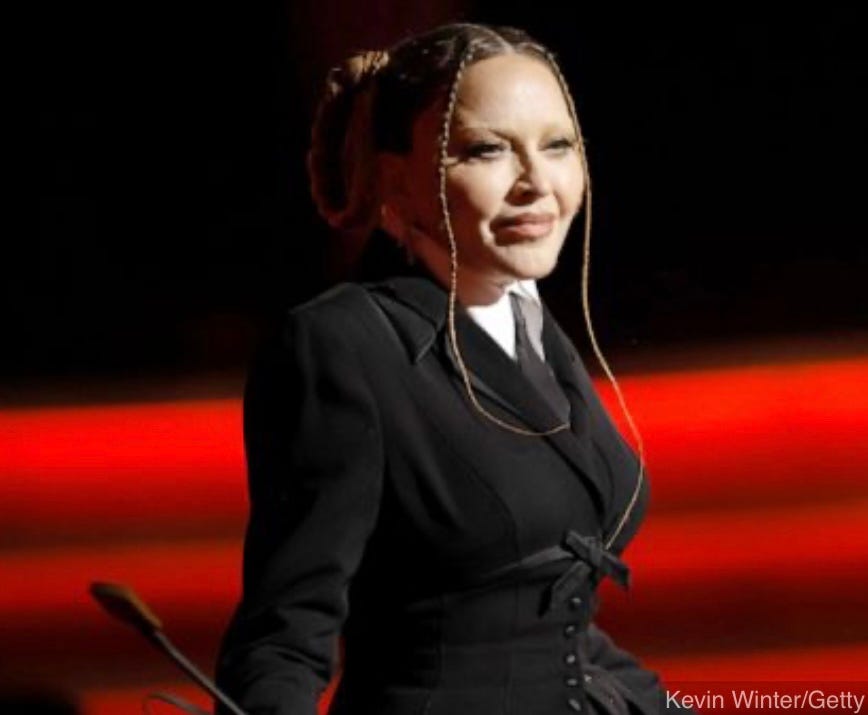

Amanda, Reading this amazing work has opened a new way to understand Madonna and her enormous impact on women....you're writing, intense and sincere, revealed a deeper understanding of how one woman carried the weight for a generation.
As always, your perspective is brilliant and unique. Paglia also championed Madonna as a powerful feminist, if I remember Sexual Personae correctly…You are the first person Ive read who has addressed her “new face” with sympathy and real insight.